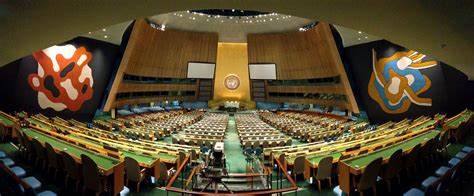This is Steve Ember with the VOA Special English program, IN THE NEWS.
The General Assembly of the United Nations will open its fifty-sixth meeting on Tuesday. Representatives of the one-hundred-eighty-nine member countries will attend the yearly meeting at U-N headquarters in New York City. The meeting will last about three months.Leaders of many countries will speak to the General Assembly during the first weeks of the meeting. President Bush is to speak September Twenty-Fourth.
The United Nations was created after the terrible destruction of World War Two. It was established by fifty-one countries in October, Nineteen-Forty-Five. The first United Nations General Assembly opened in London in Nineteen-Forty-Six. Now, almost every nation in the world belongs to the General Assembly.
A major goal of U-N is to help prevent and end wars. Many situations of tension and fighting are on the list of issues to be discussed during this year’s General Assembly meeting. One is the conflict between Israelis and Palestinians. Others include the causes of fighting in Africa and the situation in Afghanistan. Reports by the U-N international courts for war crimes in Rwanda and the former Yugoslavia also will be discussed.
The General Assembly sets the budget for the U-N. Members will discuss how much money to provide for U-N peace-keepers and other organizations around the world.
For example, on Thursday the U-N refugee agency appealed for security help for Macedonian and ethnic Albanian refugees. Both groups are afraid to return home after seven months of fighting in Macedonia. Observers say either the U-N or the European Union should send a force to protect the refugees.
U-N peace keeping forces have been sent around the world. The U-N helped clear buried bombs in Mozambique. It trained police in Haiti. It supervised Nineteen-Eighty-Nine elections in Namibia.
Governments sometimes request other kinds of help. In Liberia, the U-N has opened a peace-building support office. In Cambodia, the U-N operates a human-rights office. In Guatemala the U-N is helping to see that peace agreements are made effective.
Some U-N activities involve troops. Others involve issues. The U-N Conference Against Racism met this week in Durban, South Africa. Delegates to this meeting on racial injustice struggled to reach agreement on some major issues. Arabs demanded that the any statement call Israel a racially unjust state. Earlier in the week, Israel and the United States walked out of the conference. They refused to accept that accusation.
Such disputes in U-N organizations and meetings are not unusual. Neither are criticisms of the world organization. Some people say the U-N is weak. Yet others say the United Nations is extremely important to world peace.
This VOA Special English program, In the News, was written by Jerilyn Watson. This is Steve Ember.
